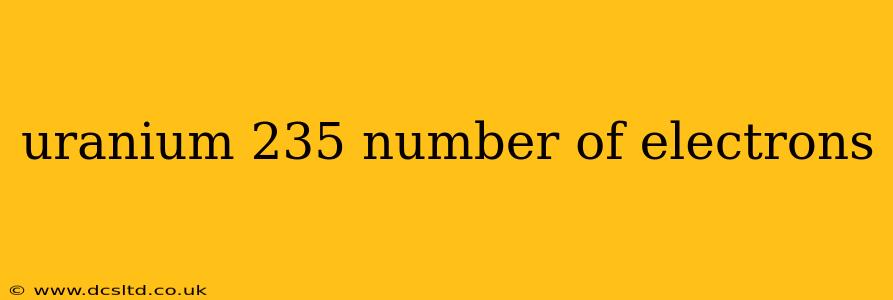Uranium-235: Unpacking the Number of Electrons
Uranium-235, a crucial isotope in nuclear reactors and weaponry, often sparks curiosity about its atomic structure. One common question is: how many electrons does it possess? The answer lies in understanding the relationship between atomic number, protons, and electrons in a neutral atom.
Let's break it down:
What is the Atomic Number of Uranium?
The atomic number of an element defines its identity and is equal to the number of protons in its nucleus. For Uranium (U), the atomic number is 92. This means every uranium atom has 92 protons.
Protons, Electrons, and Neutrality
In a neutral atom, the number of electrons orbiting the nucleus is equal to the number of protons. This balance ensures the atom carries no net electrical charge. Therefore, a neutral Uranium-235 atom has 92 electrons.
The Significance of "235" in Uranium-235
The "235" in Uranium-235 refers to the mass number, which represents the total number of protons and neutrons in the atom's nucleus. While the mass number affects the atom's stability and behavior, it doesn't change the number of electrons in a neutral atom. Both Uranium-235 and Uranium-238 (another common isotope) have 92 electrons when electrically neutral.
Ions and Electron Count
It's important to note that if a Uranium atom loses or gains electrons, it becomes an ion and will no longer have 92 electrons. A positively charged uranium ion (cation) would have fewer than 92 electrons, while a negatively charged uranium ion (anion) would have more. However, in its natural, neutral state, a Uranium-235 atom always has 92 electrons.
How many neutrons does Uranium-235 have?
This is a frequently asked question related to Uranium-235's properties. Since the mass number (235) is the sum of protons and neutrons, and we know there are 92 protons, the number of neutrons is 235 - 92 = 143 neutrons.
What are the different isotopes of Uranium?
Uranium has several isotopes, the most common being Uranium-238 and Uranium-235. These isotopes differ in their number of neutrons but share the same number of protons (and therefore, the same number of electrons in their neutral state). The differing neutron counts significantly impact their nuclear properties and applications.
Why is Uranium-235 important?
Uranium-235's significance stems from its fissile nature – meaning it can sustain a chain reaction of nuclear fission. This property makes it crucial fuel for nuclear reactors and a key component in nuclear weapons. The less abundant Uranium-235 must be enriched to higher concentrations for these applications.
In conclusion, a neutral Uranium-235 atom possesses 92 electrons, reflecting its atomic number and the fundamental principle of electrical neutrality in atoms. Understanding this fundamental aspect is key to grasping the behavior and applications of this important element.
